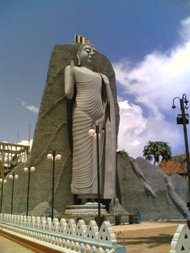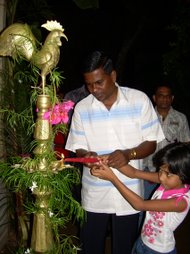Killing Lasantha the worst example of media suppression An interview with media activist Sunanda Deshapriya. ----The Sunday Leader Q: How do you view the assassination of Lasantha Wickrematunge? Is it an isolated attack on a prominent journalist for his brand of journalism or one in a series of attacks to suppress the media? A: This is very much a part of a series of calculated attempts to stifle the media. Any one who decided to kill Lasantha must have carefully considered the consequences of his killing. Killing Lasantha is not killing some journalist in Jaffna or Batticaloa where there is a strong culture of violence still prevailing together with war conditions. Lasantha is an internationally reputed journalist, an award winning journalist and also the symbol of dissenting voices in Sri Lankan media. Whoever who decided to kill Lasantha wished to silence the dissenting voices in this country. This is therefore is a symbolic killing, not an individual's killing alone. They want to kill the campaign, it is a movement suppress the media. I don't think some lunatic group carried it out but this is part and parcel of the ongoing media suppression in this country. Q: Sri Lanka according to the IFJ ranking is the fifth most dangerous place for journalists. A: Very much so. Some 17 journalists and media workers have been killed and already Tissainayagam and others are in custody under the PTA for over 300 days while others too are threatened and intimidated in many ways. During the past three years, we have recorded at least 100 incidents per annum. That is a terrible record. Dozens of journalists have been assaulted and media institutions have been brought under control through various measures. Media outlets have been shut down. It is undoubtedly a very dangerous place for journalists. Q: After Lasantha's assassination, how do you view the threat perception to other journalists? A: There is a saying that you kill a journalist and silence a hundred. By killing someone like Lasantha, you kill many thousands. Everyone who wants to be critical, dig deep into a story, practice investigative journalism would now think twice whether they could do this or not. Threats would naturally increase and the fear psychosis will multiply. In this violent backdrop, one can't sit back and relax either. Killing Lasantha is probably the most dangerous development we witnessed in the recent past. This trend must be arrested. Q: Many a journalist here highlights issues of good governance, media freedom and human rights in Sri Lanka. Despite all that, very few journalists tread the crucial ground of calling for negotiated peace, creation of a pluralistic society and a policy of non-racial administration perhaps where Lasantha really stood apart. Does this mean that the media is becoming racially segregated as well? A: Certainly. We are truly an ethnically polarized country. Among those who stood for non-discriminatory treatment of all ethnic communities, Lasantha was a pioneer. He always stood for a political solution. That was a difficult stance to adopt and defend. But he did it. He also looked critically at any military solution and did not lose sight of the ravages of war that impacts on civilians. Whether we agree with him or not, he had the courage to criticise the most powerful people in this country and to name them and dig deep into those issues. He embarrassed, ridiculed and exposed the mighty forces. While being a very courageous investigative journalist, the leading figure in investigative journalism, he was also a great advocator of a pluralistic society. He stood fearlessly for non-discriminatory treatment of all communities and a political solution. He abhorred a military solution. That perhaps was one of the reasons that caused sinister forces to kill him. Q: Lasantha made strong statements regarding the attack on the MTV/MBC stations. He predicted attacks would not cease and many others would be victimised. He became the next victim. Do you see any connection between the MBC attack and his killing? A: I do. In fact I see them as two parts of a single series of events. They are not two separate incidents from a layman's view. Both groups were wearing black and they could be the same group. They appeared to be comfortable with weapon handling. I am personally aware that Lasantha realised how much he was under threat. That's where he stands alone again. He was previously followed, shot at, his house was attacked and his printing press was burnt down. He never self censored whereas the majority of others are practicing self-censorship for survival. He knew he was being followed and that he would be killed. They were on a mission to kill him and silence that powerful voice. But Lasantha too was on a mission and his mission was his passion. This was his way of fulfilling his duty to his country. He was not doing it for personal gain. It was a cause he felt deeply committed to. Q: In a situation like this, naturally journalists are going to be fearful of discharging their duties. But what can be done to mobilize the civil society to fight for media freedom? A: I think it is very important that as a journalists, we stand together. First, we must shed all our differences. We do the same job. That alone should be a binding force. We should protest against the killing of Lasantha, a beacon of light in Sri Lanka journalism. We should stand together and fight for the freedoms that are now being denied. We also need people's organisations and to say 'enough is enough.' Our silence is going to breed more criminality, so we must act fast. All political parties, both in government and opposition should come out in defence of media freedom. We should together try to arrest this dangerous trend of killing journalists. If we remain divided, there won't be a civilised country left. We should not go back and sit back after a single protest. We should do our duty to the people as journalists and create and maintain the space that is rightfully ours. Final interview by Lasantha In what was his last interview to the print media, Editor of The Sunday Leader, Lasantha Wickrematunge on December 12, 2008 commented on the status of the Sri Lankan media as one that was no longer reflecting dissenting voices. He said there was space for the media despite emergency being invoked, but it came at a price - such as white vans, death threats, loss of advertising, frivolous litigation and sometimes, death itself. But those who wished to take the difficult path did so, though few and far between, he noted. In a brief interview in which he commented on the island's status of the media to form a South Asian media assessment initiative, he added that if prepared to take the risk, it was possible to be read and heard, as there was no official censorship prevailing - a fact that the media should make maximum use of. He identified the real problem to be self censorship, not so much due to the above-mentioned threats but more as a survival tool. He believed self-censorship to be more harmful than state oppression for it destroyed the spirit within the media community than due to forces from outside. Among the key problems he identified in the media was the fostering of polarized concepts - and the recent two years saw racism being built into the media with the vernacular mainstream media often taking extreme lines. Commenting on recent comments by the Sri Lanka Army Commander declaring Sri Lanka to be the land of the Sinhalese and that others lived at the majority community's pleasure, he said such comments would influence many others to adopt a hardline. He noted that there were restrictions on the coverage of war, non-disclosure of the battle casualties of late, concealment of human rights violations and a reduction in the reflection of the suffering of the IDPs. Besides, he noted that new perceptions were being created that every Tamil was a LTTE sympathizer, that in the prosecution of war, there appeared to be rejoicing of aerial bombardment to the extent of overlooking collateral damage to civilians. "That's a horrible mindset to reach. It is also important to note that when the southern insurrection was crushed, there was no hoisting of flags etc., unlike in this instance when Tamils were made to feel separated. The media has been creating this perception," he noted. Wickrematunge noted that there was social obligation to journalism that cannot be ignored - but was being overlooked because it is assumed to be not very popular. "One must state the truth and create spaces for diversity and democracy. That may not be a popular choice. But it is a must," he added. He noted that the prevailing situation was not confined to Sri Lanka but the international community paid less attention perhaps because they had little stakes in Sri Lanka as they would in Serbia or Bosnia.
"Star Lanka Online" Our NEW Web site And Web TV Channel Launched
TFGE , The Future Global Educational Center Has Launched
the official web site, called
*** Star Lanka Online Dot Com ........................
www.starlankaonline.com will be completed in very near future....
*** Star Lanka Online TV Channel,..................
Just One Click ahead ...
Now you can watch "Star Lanka Online TV" channel broadcasts from Matara, Sri Lanka in most part of the day. Still we are keeping a test transmission also. There is a link right side of your hand to watch our TV channel. You can watch (Click On the Box) live channel on this site without going to another site to watch the TV. and also recorded parts, following the below link.
the official web site, called
*** Star Lanka Online Dot Com ........................
www.starlankaonline.com will be completed in very near future....
*** Star Lanka Online TV Channel,..................
Just One Click ahead ...
Now you can watch "Star Lanka Online TV" channel broadcasts from Matara, Sri Lanka in most part of the day. Still we are keeping a test transmission also. There is a link right side of your hand to watch our TV channel. You can watch (Click On the Box) live channel on this site without going to another site to watch the TV. and also recorded parts, following the below link.
Place your Own Ad Here
Monday, January 12, 2009
Killing Lasantha the worst example of media suppression
Subscribe to:
Post Comments (Atom)





No comments:
Post a Comment